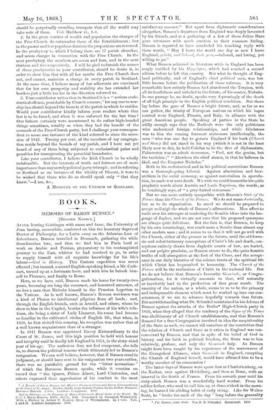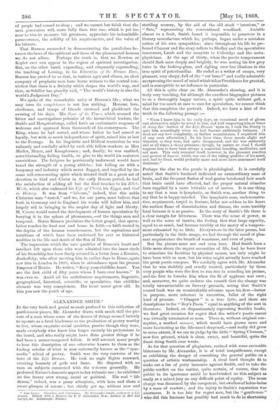BOOKS.
MEMOIRS OF BARON BUNSEN.* [SECOND NOTICE.
AFTER leaving Gottingen with name and fame, the University of Jena having, meanwhile, conferred on him the honorary degree of Doctor of Philosophy, for a Latin essay on the Athenian Law of Inheritance, Bunsen travelled in Denmark, gathering the while Scandinavian lore, and then we find him in Paris hard at work on Arabic and Persian, preparatory to his contemplated journey to the East, whither he had resolved to go, in order to supply himself with all requisite knowledge for his life's labour—God in History. This Eastern expedition was never effected ; but instead, a second English-speaking friend, a Mr. Cath- cart, turned up at a fortunate hour, and with him he betook him- self to Florence, and finally to Rome.
Here, as we have said, Bunsen made his home for twenty-two years, becoming ere long the successor, and honoured successor, of no less a man than Niebuhr himself in the Prussian Legation to the Vatican. As is well known, Bunsen's Roman residence was a kind of Pharos to intellectual pilgrims from all lands ; and, through the English friends, such as Arnold, and others, whom he drew to him in the Capitol, besides the influence of his wife's rela- tions, she being a sister of Lady Llanover, his name had become so familiar in the cultivated circles of English life, that when, in 1838, he first visited this country, his reception was rather that of a well known acquaintance than of a stranger.
In 1811 Bunsen was appointed Envoy Extraordinary to the Court of St. James, and this high position he held with honour and integrity until he finally left England in 1854, in the sixty-third year of his age. The authoress does not feel competent, she tells us, to discuss the political reasons which ultimately led to Bunsen's resignation. We can well believe, however, that if Bunsen erred in judgment, or should have sent in his resignation two years earlier, there was no justifiable ground for the " bitter accusations " of which the Baroness Bunsen speaks, while it remains on record that " the Queen, Prince Albert, Lord Clarendon, and others expressed their approbation of his conduct in the most
* A Memoir of Baron Blown, late Mini,t,r Plenipotentiary and Envoy Extraordinary at the Cowl of .51. James. Drawn chiefly from Family Papers, by his widow, Frances, Baroness Bunsen. 2 vole. London: Longmans. 1868.
God in Ilistory; or, the Progress of Maris Faith in the Moral Order of the World. By
C. C. J. Baron Bunsen, D.Ph., D.C.L., D.D. Translated by Susannah Winkworth. With a Preface by Arthur P. Stanley, Dean of Westminster. In 3 vols. Vols. L and IL London; Longmans. 1868.
satisfactory manner." But apart from diplomatic considerations altogether, Bunsen's departure from England was deeply lamented by his friends, and at a gathering of a few of these Julius Hare gave utterance with much emotion to their common feeling. Bunsen is reported to have concluded his touching reply with these words, " May I leave the world one day as now I leave England, yeliebi, end liebeud, dock Bern,—beloved, and loving, yet willing to go."
What Bunsen achieved in literature while in England has been amply testified by his Hippolytus, which had reached a second edition before he left this country. But what he thought of Eng- land politically, and of England's chief political Alen, was but little known before the publication of these volume-3. It is very remarkable how entirely Bunsen had abandoned the Toryism, with all its fearfulness and unbelief in the future, of his master, Niebuhr. In one passage he, no doubt, speaks very depressingly of the death of all high principle in the English political condition. But there lay before the gaze of Bunsen a bright future, and, as far as we can gather, the trinity of European nations on which his hopes centred were England, Prussia, and Italy, in alliance with the great American people. Speaking of parties in the State he oddly enough says that the Radicals were the only politicians who understood foreign relationships, and while Gladstone was to him the coming foremost statesman intellectually, the man " who was one day to govern England if his book (Church and State) did not stand in his way (which it is not in the least likely now to do),. he held Cobden to be the first of diplomatists. Paltnerston was an adroit steersman, " Peel, not the genius, but the tactician ;" " Aberdeen the chief sinner, in that he believes in God, and the Emperor Nicholas."
Both in his ecclesiastical and in his political convictions Bunsen was a thorough-going Liberal. Against absolutism and hier- archism in the social economy, as against materialism in specula- tion, he made war unto death. 1Ve wish we could transcribe his quite prophetic words about Austria and Louis Napoleon, the words, as he touchingly says, of " a grey-haired statesman."
But we can more entirely sympathize with Bunsen's State of the Future than his Church of the Future. We do not mean doctrinally, but as to its organization. In creed we should be prepared to accept well nigh the whole of Bunsen's affirmations. Men affect to smile over his attempts at rendering the Semitic ideas into the lan- guage of Japhet, and we are not sure that his proposed synonyms are always quite felicitous. But the fact is, that Bunsen, to keep by his own terminology, was much more a Semite than almost any other modern man ; and it seems to us that it will not go well with the Church, either of the present or the future, until the old foren- sic and substitutionary conceptions of Christ's life and death, con- ceptions entirely drawn from Japhetic courts of law, are buried, and our pulpits proclaim, as Bunsen strove to do, the quite Semitic truths of self-abnegation at the foot of the Cross, and the accept- ance in our daily histories of the solemn trusts of the spiritual life which Christ has bequeathed to humanity. The Church of the Future will be the realization of Christ in the national life. But we do not believe that Bunsen's favourite Gemeinde, or Congre- gationalism, for it virtually amounts to that, will naturally or inevitably lead to the production of that great result. The sanctity of the nation, as a whole, seems to us to be the primary and indispensable element which must be worked up into our con- sciousness, if we are to advance hopefully towards that future. But notwithstanding what Dr. Schenkel maintained in his defence of Bunsen against the attacks of the Berlin* High-Church party in 1856, when they alleged that the tendency of the Signs of the Times was abolitionary of all Church establishments, and that Bunsen's demand for a free Congregation involved in idea the unspirituality of the State as such, we cannot rid ourselves of the conviction that the relation of Church and State as it exists in England was mis- conceived by Bunsen, and that in spite of his belief of God in history and his faith in political freedom, the State was to him relatively, profane, and only the Gemeinde holy. As Bunsen
might have been taught by his experience of the narrowness of the Evangelical Alliance, what Genteinde in England, excepting the Church of England herself, would have affirmed him to be a worthy member of its communion ?
The latter days of Bunsen were spent first at Charlottenberg, on the Neckar, over Against Heidelberg, and then at Bonn, with an interval in the South of France. From his seventh year until his sixty-ninth Bunsen was a wonderfully hard worker. From his soldier father, who used to call him up at three o'clock in the morn- ing, he learned his abiding habit of early rising. Like Sir Walter Scott, he " broke the neck of the day " long before the generality
* Fiir Bunsen, wider Stahl. Von D. D. Schenkel. Darmstadt. 186.
of people had ceased to sleep ; and we cannot but think that the next generation will, more fully than this one, which is yet too near to him to measure his greatness, appreciate his indomitable perseverance, the solidity of his acquirements, and the value of his labours.
That Bunsen succeeded in demonstrating the parallelism be- tween the laws of the spiritual and those of the phenomenal kosmos we do not affirm. Perhaps the truth is, that no Newton or Kepler ever can appear in the region of spiritual investigation. But, on the other hand, expanding, and eloquently expounding, the teaching of Lessing, in his Education of the Human Race, Bunsen has proved to us that, in various ages and climes, an elect company of prophetic men have borne witness to the central con- viction that there is a divinity which shapes the world's way, and that, as Schiller has grandly said, "The world's history is also the world's Judgment Day."
We spoke of the remarkable unity of Bunsen's life ; what we may term its completeness is not less striking. Honour, love, obedience, and troops of friends crowned and gladdened the evening of his days. His Signs of the Times, which aroused the bitter and unscrupulous polemics of the hierarchical leaders, the Stahls and liengstenbergs, called forth an enthusiastic response of welcome and approval from thousands of his countrymen. The King, whom lie had served, and whose father he had served so loyally, but with so much independence of spirit, raised him at last to the Peerage. In his linguistic and Biblical researches he was valiantly and cordially aided by such able fellow-workers as Max Muller, Meyer, and Kamphauseu ; and, finally, he was enabled, notwithstanding failing health, to give to the world his maturest convictions. The fatigues he persistently underwent would have taxed the strength of a young athlete ; but toiling on with a buoyancy and industry which never flagged, and impelled by the same self-consecrating spirit which uttered itself in a great act of devotion to God and Christ in the early Roman period, he had the satisfaction of adding all but the final touches to his Bawl- Werk, which also embraced his Life of Christ, his Egypt, and God in History. It was from "labours," indeed, that this noble Christian man "rested," and we, for our parts, must believe that both in Germany and in England his works will follow him, and largely aid in bringing in the ampler day of light and liberty. M. Comte would round the development of human speculation by burying it in the sphere of phenomena,—of the things seen and temporal. Baron Bunsen proclaims the better gospel, that specu- lation reaches its final rest and home in faith—a faith rooted in the depths of the human consciousness, but the aspirations and intuitions of which have been enshrined for ever as historical realities in the life and death of the Son of Man.
The impression which the rare qualities of Bunsen's heart and intellect left upon those who were admitted into the inner circle of his friendship has been finely uttered in a letter from a Russian, Joukoffsky, who after meeting him in earlier days in Rome, again saw him in London in 1839, when in attendance upon the present Emperor of Russia. He writes, " Keep your childlike heart. You are the first child of fifty years whom I have ever known." It was even so. Amid all his multifarious acquirements, linguistic, geographical, historical, scientific, or speculative, this childlike element was very conspicuous. His heart never grew old. In him you saw the youth of age.































 Previous page
Previous page